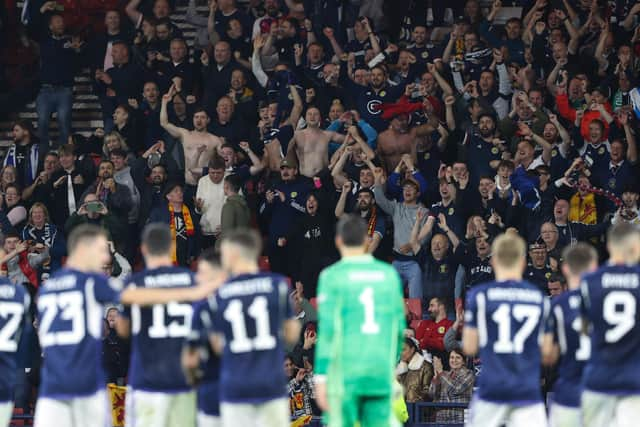Scottish football on the rise: 10 reasons to talk up our game after Scotland's Nations League success
Here are 10 reasons to be cheerful about the current state of our game ...
1. The terms ‘elite’ and ‘Scotland national team’ rarely appear in the same sentence. They are today, though, after Steve Clarke’s men earned themselves top tier status in international football. Alright, it is only in the context of the Nations League, but still…The valorous scoreless draw by a makeshift Scotland team against Ukraine in Krakow that has earned Clarke’s men promotion to League A for the 2024-25 edition of the tournament could see Scotland rubbing shoulders with such as France, Italy, Spain and Germany come then. Three years ago, Scotland were in the second bottom rung for the tournament - a League C country. The subsequent two group wins to step them up represent the only times Scotland have topped international sections since 1981.
Advertisement
Hide AdAdvertisement
Hide Ad2. The bounty from the Nations League Group B1 success could be plentiful. Stashed away is the guaranteed fall-back play-off place for Euro 2024. However, the fact that Scotland’s endeavours over the past week have claimed them a pot two ranking for the regular qualifying campaign for the Euro finals in two years means there should be genuine optimism they can qualify directly from the group into which they will be drawn a week on Sunday. The juicy possibility is that they could be placed in a section alongside Hungary, Armenia, the Faroe Islands and Malta. Dare it be said, but surely qualification would be assured from such an appealing group - arguably the easiest on offer. The most arduous, potentially - something like Spain, Ukraine, Turkey and Slovakia - would be testing but as a nation on the up under Clarke, Scotland would still fancy themselves in such company.
3. The profound selection issues with which Clarke required to grapple in melding a Scotland line-up for Tuesday’s Ukraine assignment meant only five of the XI - John McGinn, Callum McGregor, Craig Gordon, Che Adams and Jack Hendry - could be considered probable starters if he had the luxury of choosing from his full complement of personnel. The fact that such as debutant Ryan Porteous and 20-year-old Aaron Hickey came through an exacting test with displays that firmly burnished their reputations points to Scotland’s talent pool being of a greater depth than at any point in the previous decade. Outside of the forward line, it would appear Clarke now has that manager’s dream of possessing - at least - two capable players for every position.
4. Overlooked amidst the many accolades heaped on to Scotland for the mission accomplished in Poland was the extent to which the outcome was a triumph for native player development. It isn’t so long ago that the national team identification department regularly trawled the English Championship for competent performers with Scottish grannies. They did so because there wasn’t considered sufficient home-grown talent of international standard. Changed days, judging by the players deployed against Ukraine. All but Che Adams and Lyndon Dykes were born, raised and cultivated in Scotland. Products of the academies of Celtic (Callum McGregor, Anthony Ralston, Jack Hendry), Hearts (Craig Gordon, Aaron Hickey), Aberdeen (Ryan Fraser, Ryan Jack), Rangers (Greg Taylor, Kenny McLean), St Mirren (John McGinn), Hibs (Ryan Porteous), Inverness Caledonian Thistle (Ryan Christie), Dundee United (Stuart Armstrong) and Falkirk (Stephen Kingsley).
5. In Steve Clarke we Scots can trust. The phlegmatic 59-year-old is on his way to becoming the national team’s most effective manager since Craig Brown…the last man before him to have led the country to a major finals. This week Clarke brought up 40 games in charge, the same figure as Gordon Strachan, who had his moments. Indeed the pair share a 47% win record for their matches in charge. That is slightly better than Brown’s 45%, and has been bettered by only three men - Ian McColl, Tommy Docherty and Alex McLeish - who have helmed Scotland for more than 10 games.


6. The upswing in the cross-border arena need not be reserved to the national side. Celtic earned rave reviews for going toe-to-toe with Champions League holders Real Madrid - before losing out 3-0 to the Spanish behemoths - in the group stage opener three weeks ago. The fearless, intoxicating attacking style of Ange Postecoglou’s men has made them one of the most eye-catching teams assembled within these borders in recent times. In the coming weeks, thanks to their recent draw away to Shakhtar Donetsk they have a genuine possibility of becoming the first Scottish side to progress to the last 16 of European football’s blue riband competition for a decade. It is a tall order, undoubtedly, but not impossible for them to post two wins in their double header against RB Leipzig, the first leg of which rolls around in Germany next Wednesday. If they were to do that - as Madrid take full points from their meetings with Shakhtar - a Scottish club really would be back among the big boys.
7. Rangers may be enduring a thankless Champions League group campaign. One unlikely to take a turn for the better as they face a trip to Anfield for a scary encounter with Liverpool following heavy losses inflicted by Ajax and Napoli. At least the Ibrox club are in the mix at the highest level of European club football, though - arriving there courtesy of a commendable qualifying campaign. And the fact they have earned Champions League football alongside their great rivals - and direct entrants - Celtic still represents reputation enhancement for our game. Not since the pair contested the group stages in 2007-08, has Scotland had two teams in the Champions League, so the duo’s very presence in the group stages is to be celebrated.
8. The travails that have beset Rangers in the past month should not be allowed to sully memories of their fantastical run to the Europa League final in May. Remember, it was generally felt that we had seen the last of a Scottish club in a European decider with the 2008 UEFA Cup final loss to Zenit St Petersburg by Walter Smith’s Ibrox side until Giovanni van Bronckhorst’s men broke through a glass ceiling last season…before having their hearts broken with a penalty shoot-out loss to Eintracht Frankfurt in Seville. Yet, their exploits - adorned by famous successes over Borussia Dortmund and RB Leipzig - are central to Scotland currently occupying the lofty position of eighth in the UEFA rankings. For context, you require to go back to 1998, when the country sat seventh, for a more exalted status for the nation in the European football firmament.
9. No fewer than 688,606 tickets have been sold for cinch Premiership games across the first seven rounds of matches this season. If attendances continue at this current rate across the next four-fifths of the league season then the total for the campaign will exceed any previous season across this millennium. Currently, the high on that measure is the 3,681,681 combined attendances witnessed for the 2005-06 term, when the game was experiencing a boom in interest. We could be about to see a post-pandemic equivalent.


Advertisement
Hide AdAdvertisement
Hide Ad10. It might be considered controversial to cite the new Sky Sports TV deal as one of bright facets of the Scottish game at present. But it shouldn’t be. The freshly-inked five-year deal worth a guaranteed £150m breaks down to £30m a season, starting from 2004-25. However, that could rise to £40m. As well as the guaranteed 60-game package, a further 20 games that will available in two packages that could net a further £8m. In addition, the 60 pay-per-view games clubs themselves can sell - each team able to offer five - could be worth another £2m. Therefore, inside a mere three years, the revenue from Scottish football’s broadcast rights has the potential to almost double (the current deal worth around £25m a season). Such growth would be rare in an increasingly challenging marketplace. Moreover, the new TV deal, boasting a £600,000 investment in the women’s game, as well as sponsorship of the SWPL’s League Cup, represents the biggest commercial deal in the history of Scottish women’s football.
Comments
Want to join the conversation? Please or to comment on this article.